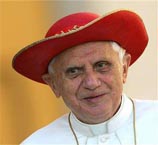Benedict to push reconciliation on first Africa papal visit
 Johannesburg - Four years after his ascension to the throne of St Peter, Pope Benedict XVI embarks on his maiden visit as pontiff this week to Africa, the continent where the Catholic Church is growing the fastest.
Johannesburg - Four years after his ascension to the throne of St Peter, Pope Benedict XVI embarks on his maiden visit as pontiff this week to Africa, the continent where the Catholic Church is growing the fastest.
The pope's six-day visit takes him to Cameroon and Angola to meet with political and church leaders, lead young Catholics in prayer at two mass rallies and visit charities working with some of the world's poorest people.
By contrast with his predecessor, Pope John Paul II, who visited Africa 16 times, more than to any other continent, Benedict XVI is a newcomer. His first and only visit was as a cardinal to the Congolese capital Kinshasa in 1987.
And yet Africa is only continent where the church is gaining ground in the battle for souls. Vatican figures show the proportion of Catholics in Africa increasing by 3.1 per cent in recent years, faster than population growth, to 139 million people.
In Asia and the Americas, the church just held its own during that period, while in Europe Catholicism is in steady decline.
African Catholics had hoped in 2005 that their enthusiasm might be rewarded with an African successor to John Paul.
The then cardinal Joseph Ratzinger himself has declared it would be "a wonderful sign for all Christianity" before being awarded the mitre.
Africa is a fertile recruiting ground for churches, partly because the burden of suffering on the continent. In the face of hunger, disease and tyranny, many people turn to religion for solace.
Some churches are no more than tents with a smattering of plastic chairs but mass in Africa is celebrated with an effervescence that is absent in the hallowed chapels of the Old Continent.
Dancing, clapping, drumming are de rigueur at packed services from Soweto township in South Africa to war-scarred Luanda, capital of Angola, the first sub-Saharan African country to be evangelized 500 years ago, where at least one in two is Catholic.
These days the Good News is flowing in both directions. As Europe's seminaries dry up of candidates for the priesthood, African priests, who are in plentiful supply by comparison, have begun manning the pulpits.
And yet the Catholic Church cannot afford to take a day of rest in Africa, where Pentecostal churches and Islam are providing stiff competition in the battle for souls. Around 17 per cent of Africans are estimated to be evangelical or charismatic Christians, compared to less than 5 per cent three decades ago.
Churches like the Zion Christian Church, whose annual Easter rally in South Africa is attended by millions of members, offer a seductive cocktail of traditional and Christian beliefs.
In east and central Africa, Catholicism is also being squeezed by the spread of Islam.
During his visit, the pope plans to stress the "the church in Africa at the service of reconciliation, justice and peace."
While the church's reputation has been tarnished by the involvement of at least two Catholic priests in the 1994 Rwandan genocide, in countries like Zimbabwe and Angola it has loudly denounced human rights violations.
In Angola, a still nominally Marxist state, which emerged from a 27-year civil war only seven years ago, the church-funded Radio Iglesia is rare and authoritative source of independent news.
And while the church has been roasted for its hardline stance on HIV/AIDS prevention, namely for promoting abstention over condom use, many priests on the frontline of the pandemic are taking a more pragmatic line.
Stefan Hippler, a Catholic priest from the pope's homeland who runs an AIDS foundation in Cape Town, has openly defied the church on condoms.
"In the end of the day we have to protect life from the beginning to the end," he says.
One of Benedict's chief aims during his visit is also to prepare for the second synod of African bishops to be held in Rome in the autumn. In Cameroon he will meet with bishops from across the continent to prepare the conference. (dpa)